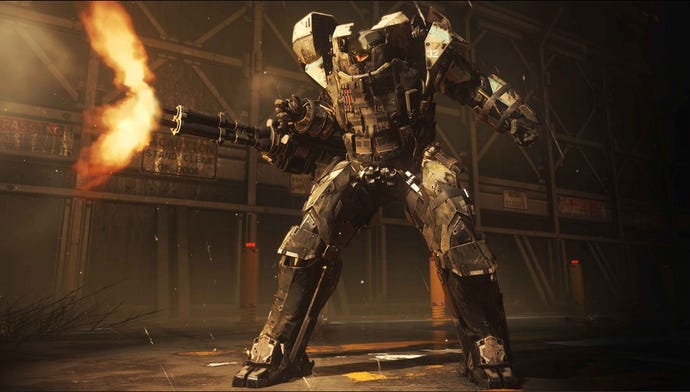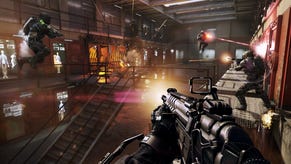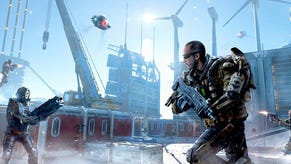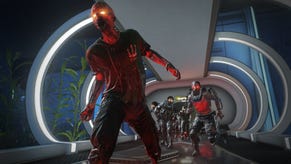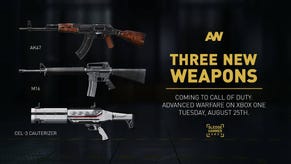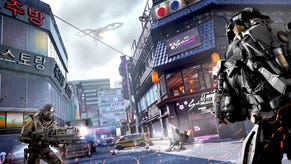Can Advanced Warfare reinvent Call of Duty?
How an RPG loot system, obscene amounts of customisation and a single-player campaign you care about will shake up Call of Duty.
"We’ve gone through so many more prototypes. If we made a mistake on something, it was okay. It also gave us a lot of time to create new tech, a new engine and tools."
Sledgehammer Games is throwing a lot at Advanced Warfare to make Call of Duty a significantly different game this year.
An annual franchise, the series needs new life if it's to continue to push first-person shooters forward. Destiny, Titanfall and Battlefield Hardline are all trying new things - Advanced Warfare has to be just as ambitious.
"How do we get some new types of gameplay in there that really changes things?" asks Sledgehammer co-founder Glen Schofield at a recent press tour for the game. "How do we continue to keep the millions of people already playing engaged in the game, and bring new players on and keep them, after all these years?"
Perhaps the biggest difference Advanced Warfare has had over its predecessors is time. This is a game that's spent three years in development, not two, letting Sledgehammer pound out version after version, tweak after tweak, and try new things, whether they fail or not.
"We've gone through so many more prototypes to iterate on and make changes. If we made a mistake on something, it was okay. It also gave us a lot of time to create new tech, a new engine and tools," he says. The PS4 and Xbox One technology has also been crucial to changing Call of Duty: "To think about the power and the capabilities that next-gen gives us. It really changes how we design because they are about ten times more powerful."
But it's the gameplay that matters before technology. How do you change a military shooter built around realistic weapons and real-world confrontation? You bump it forward 50 years in the future and give your soldier an overpowered exoskeleton.
"You are the advanced soldier," says Schofield. "That's been our mantra throughout. It's very important for us to maintain that. We have to make the player feel like they are a tier one operator 50 years in the future."
"It started with the HUD. We wanted to pull everything off the HUD and just give you as much screen as we could. That helps immerse you, and then we can take all the information and get it in the screen so you feel like you're right there."
And once you're there, Sledgehammer adds the gadgets until you're fit to burst. Augmented reality vision, threat detection, smart grenades, energy weapons, hover bikes, walking turrets. Weapons that aren't sci-fi, but are the 50-year evolution of what the military carts around today.
"We took a small team and dedicated it to just weapons. They spent their three years researching, designing, creating the new firepower. Taking old weapons from the past and seeing how much they changed over the course of 50 years and then extrapolating that out," details Schofield.
The real star though is the exoskeleton. Not only does it make your soldier tougher, it changes the way the player moves. Like Titanfall and to some extent Destiny, you're no longer stuck to the ground beneath your feet or stairs and ladders to get a higher position. What these games are doing is adding the classic platformer double-jump. It's ridiculous and completely cool at the same time.
"The heart and soul of this game is the exoskeleton. It was the very first idea from three years ago," says Schofield.
"The most fundamental change comes in the player movement," he continues. "When you add boost jump, boost slide, boost dodge and boost slam it changes not only the way the game is played, but the way we had to design the levels.
"For the last ten years we've been designing levels where you run-and-gun, upstairs, climb ladders - but now we've added verticality. We throw all that other stuff out and rethink the whole design. Some of these levels in multiplayer and singleplayer have taken two years to develop. They feel like they're handcrafted."
"Some of these levels in multiplayer and singleplayer have taken two years to develop. They feel like they’re handcrafted."
The maps I've played do feel different to standard Call of Duty. I like the vertical climb the suit gives me, but I'm not sure if it made maps feel smaller. The exo suit had me dodge out of the way of fire successfully, the boost jump is great for reaching higher ground quickly, and the shield and grenade-launching gadgets are neat as hell.
I've only played multiplayer for 90 minutes, but I didn't get bored, and the key to this was the all-new customisation system. Expanding Black Ops 2's Pick 10 system to Pick 13 - you basically have 13 slots to fill with weapons, perks, gadgets, scorestreaks and more
"If the overall game mantra was 'you are the advanced soldier', then multiplayer was about you playing your own way. We wanted to make sure there was more personalisation and customisation than we've had in multiplayer before," offers Schofield.
We hear about customisation in all games a lot, and it's clear that Sledgehammer has worked to offer more variety than ever before. In a world where players gripe about not unlocking enough items in Destiny (it's called a "rare engram" for a reason), Advanced Warfare may be spoiling its players with a design borrowed from the best MMORPGs.
"Supply Drops are our loot system," he says. "Anytime you decide to bite off on doing a loot system, it's a major thing. This is something that we've wanted to get in since day one. It took us three years to get it in. It gives everybody the opportunity to get stuff."
"In development you plan how many different options you're going to create for customisation. And then near the end you have some time left and the artists have gotten a little faster. We were doing some rough math and we have over 20 billion different combinations for creating operators. So the chances of any two of you looking the same are pretty low," laughs Schofield.
So you can add fairness in multiplayer to the list of improvements for Call of Duty, alongside obscene amounts of choice for your loadout.
Which just leaves the multiplayer maps. Again, the exoskeleton provokes a new approach to map design. But there also seems to be another number of inventive takes on maps and competitive play; whether that's an incoming tidal wave forcing players to move to higher ground in the middle of a match or the Uplink mode - a kind of American Football game that seems designed for eSports - Sledgehammer's take on the exoskeleton and the changes that makes goes far beyond novelty.
Next: is the idea that no one buys Call of Duty games for the singleplayer campaign a myth?
Will you ever care about Call of Duty: Advanced Warfare's single-player campaign?
No one buys Call of Duty for the single player game. Or so conventional wisdom says.
The campaign may not be the long-lasting focus, the reason to keep the game in your console's disc drive beyond the first week. But it's there, played a lot by the fans who want to rollercoaster through explosions, collapsing buildings, ziplines and flying bullets. It's the war movie ghost train and it's a hell of a lot of fun.
"We didn’t want it to feel like Deus Ex. We wanted to keep the pace of the game fast. We give you the loadout. It’s scripted in that sense."
"We wanted to focus on the narrative. To really spend time and tell a great story and get some really strong characters in there," says Schofield.
"What we mean is we didn't want it to be just a military story. It has to be a story about life, and hope and camaraderie, pain and loss. Characters have to have more meaning and we want you to relate to them."
It's easy to mock the idea of a quality story being told through jingoistic military gunplay, especially in a series of games where America and its allies (but mainly America) saves the day. But in Advanced Warfare it's different. The key villain is played by one of Hollywood's celebrated actors and the big bad country is replaced with a corporation. The enemy is American.
"We didn't want to pick a new nation and turn them into the bad guys. We ripped it straight from the headlines," offers Schofield.
"The rise of private military corporations in Africa, the Middle East, Afghanistan and Iran. There's more PMC operative there than there are allies. They're not governed by the Geneva Convention or any of these same rules so they're doing whatever they want. When we talk to military experts they're very afraid that the PMCs are getting too big.
"We also wanted a single protagonist. Other Call of Duty's in the past have had multiple characters but we wanted to tell the story of Private Mitchell and his growth as a marine over the course of ten years, seeing the twists and turns that he goes through."
"With the people around him we made sure they had big backstories so that they're characters that you invest in. That you have feelings towards them and that was how we were able to get Kevin Spacey involved. He was very interested in the script and he saw what we'd written for his character - he was intrigued."
"There are some people who only play one game a year, and they pick Call of Duty. If you go completely crazy you will alienate them"
Watching a demo of one of the single-player missions in Advanced Warfare we're back in familiar territory, but that's not a bad thing.
The player is charged with rescuing the prime minister of Lagos. You get no choice of loadout before the mission begins - you're given specific kit for a specific job. So you climb using the magnetic gloves, let off a mute charge in order to breach and clear and disorientate your enemies before taking them down with headshots. There's no denying it looks fun, but it feels like a throwback to the Call of Duty of old.
"We didn't want it to feel like Deus Ex. We wanted to keep the pace of the game fast," offers Schofield.
"We give you the loadout. It's scripted in that sense but you can use boost jump whenever you want in the level. We're not saying 'don't use that here'."
After the infiltration all hell breaks loose in a courtyard and it's here the players gets more freedom of movement. After an intense firefight there's a chase to a freeway, but then it's back to a heavily scripted set piece. The player must jump from roof to roof of moving trucks, taking out enemies in cars and helicopters as he goes. It's thrilling, with the final section seeing you just making the jump to the door of a truck. You swing in and out of traffic as you line up a headshot on the driver...
It's that Call of Duty campaign structure we know very well. Scripted short bursts of action, an open environment to progress at your own pace, and then a spectacular set piece to finish the level off. I'm not complaining, I'm one of the people who happily plays through the single player game.
"That's one of the fine lines," says Schofield. "How far do you change Call of Duty? Do you make it an open-world game? That's different for Call of Duty but there's a lot of open-world games.
"We lay out the game and we lay out the levels and we think about pacing, colour palette, locations, time of day, type of gameplay, vehicle placing and everything else. And we try and change it up. There are places where you have to go to this point and do this thing, but in other areas we open it up.
"There are a few places where you get to choose how you want to do it, and then there are others where it's like a zipline. We mix that gameplay up as much as we like to mix up the time of day or the colour palette."
All that talk about no one buying a Call of Duty game for the single-player game is nonsense, as Schofield points out:
"We have a hardcore audience who are very vocal about that. And there are some people who only play one game a year, and they pick Call of Duty. If you go completely crazy you will alienate them.
Next: Humble and honest, meet the team charged with reinvigorating Call of Duty
Meet the team charged with reinvigorating Call of Duty
Explosions and words.
When I listen back to a recording of my time in a presentation of Call of Duty: Advanced Warfare, all I can hear are distorted explosions, clattering gunfire and Kevin Spacey's belligerent words: "Power determines who's right. And I have the power, so I'm right."
The worry is that this is all bombast. Call of Duty isn't known for it's subtlety - what game about world war is? The difference for me with Advanced Warfare is that the developers behind it - Michael Condry and Glen Schofield - are open, genuine, humble people. There's no doubt that they, and the rest of the team at Sledgehammer Games, have worked hard over the past three years.
The fact Activision has given them three years to work on reinventing the Call of Duty franchise speaks volumes, I think. It's easy to see yearly releases as cynical, marginally updated games churned out to meet that November deadline and boost the Q4 bottom line, but Advanced Warfare isn't filler like Ghosts turned out to be.
"There's something about working on something for three years and then it's over. There's this emptiness…"
The more I see of it, the more I buy into the vision that Advanced Warfare can be the adrenaline shot Call of Duty needs.
I've interviewed a lot of game developers over the past 12 years. As a general rule, the ones working on smaller projects are more open. The more money pumped into the game, the more corporate they have to become. We don't run a lot of interviews on VG247 for precisely that reason. No one wants to hear a millionaire run off a list of marketing bullet points. But the guys from Sledgehammer - tasked with building a billion dollar experience - seem free to talk, and a million miles away from the robotic, media-trained mouthpieces that some publishers push to the front.
"Gosh it feels good to have it finally done," Schofield says during the most recent press tour for the game. "Although there's something about working on something for three years and then it's over. There's this emptiness…"
Schofield initially looks quite imposing. He wouldn't look out of place with an AT 4 under each arm. But see him from a distance while he waits for the press to filter into the venue and he's sketching on his pad - nothing high-tech, just pencil and paper. He carries a portfolio around with him rather than high-powered weaponry, and when I joke that he's "the George Michael of games development" (for some reason I can't remember, probably nerd nerves) he doesn't punch me in the face as that comment deserves. I don't know many games developers I feel comfortable joking with.
"When Activision came to us three years ago and we were to be only the third studio to work on Call of Duty, it was extremely humbling," he says. "It's been a true honour to work on a title like this."
This new team is clearly bringing a fresh approach to the game and a respectful attitude. It's isn't running off at the mouth. Apart from the multiplayer work it did on Modern Warfare 3, the people at Sledgehammer aren't known for their first-person shooter credentials. Instead, they come from Visceral Games, the studio behind fan-favourite Dead Space.
In this case, not being developed by Treyarch or Infinity Ward is one of Advanced Warfare's biggest attractions.
"We listened to the fans, we listened to the press and we listened to our hearts," says Schofield.
"I've been working on games for 20 years, and we hope we've done the brand justice.
"Michael (Condry) and I sat back the other day and we had a moment to reflect after working so hard for the past three years. I said to him, 'is this the best game we've ever made?' We both looked at each other and said 'yes'. It's the culmination of all our years of experience."
From years of interviewing developers and publishers, advertisers and marketing people, you can usually tell those that are going through the motions and those that are still genuinely excited about their game. Not their product, but their game. When Schofield says "I hope you enjoy it", it's genuine.
Now the journey is almost over - the game is about to be mastered after a final shakedown in time for it's November release - I ask Schofield how it feels to finish three years of intense work.
"I don't know whether to cry or laugh," he says. I believe him.
